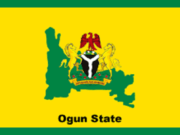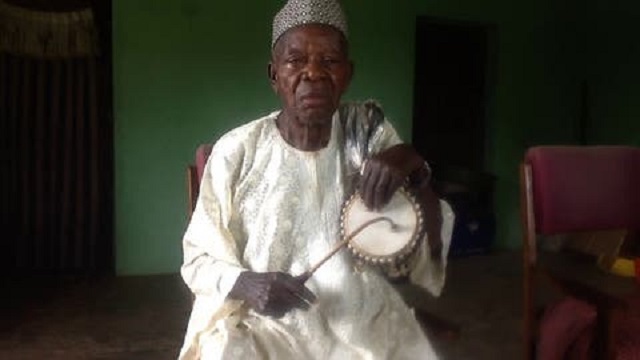“Eyin eyan yi, ti nba ti wa ku nko? (You these people, what if I had died?).” That was how celebrated drummer, Alhaji Rahman Adewole, a.k.a. Oniluola – one who drums self into wealth – welcomed my crew and me to his house on May 24, 2019. In Oniluola’s home that mid-day, I didn’t see wealth at all. I met him poor, very poor.
Oniluola’s death on Tuesday marked an almost total closure of the legends behind the genre of traditional Yoruba African music called Apala popularized by late Ayinla Omowura. Oniluola was the lead drummer of that leading Yoruba musician. Killed on May 6, 1980 in a barroom squabble.
Omowura and Adewole were the musical twin who popularized that genre. While Omowura passed on at the age of 47, Oniluola died last week at 97.
In writing the book, Ayinla Omowura: Life And Times of An Apala Legend (2020) authored by me, it was almost inconceivable that a biography of the musical legend, Omowura could be written without Oniluola’s voice. In the bid to get to him, my crew (consisting of Waheed Ganiyu and Idris Oderinde) and me booked several appointments that spanned almost a year which failed to materialize due to our inability to get to Abeokuta, Ogun State where he lived. To be specific, I was the author of that failure due to my busy schedule. The nonagenarian and I spoke on phone about twice before our eventual meeting and he always underscored how time was of the essence, saying that having advanced in age, the Creator could call him to eternity anytime.
Though we had booked an appointment for that day, it was apparent that the aged drummer didn’t believe us, having serially failed to honour previous ones. And off to the Kesi area of Abeokuta, Isale Itoko, we went. We had an anchor, a drummer as well, who was our link to him, who led us to what eventually looked like a shack that served as the drummer’s home.
Baba Adewole’s house was inaccessible to vehicles, so we had to park our car at a distance to where he lived. The rest, we ploughed with our feet. And then our jaws began to drop. In fact, while trekking, we had to walk on a wooden bridge over a small stream. Then our guide made to walk into one very old house. We thought he had made a mistake. We were going to the famous Adewole Oniluola’s house, we scolded him from within us. We followed him nevertheless. And inside a passage of about 6-roomed bungalow, which Yoruba ingenuously nicknamed Face-me-I-face you, we momentarily halted. My memory seems to be failing me now but I am not sure if the floor was paved or if the house had a ceiling.
An old woman, whom we later found out was Baba’s wife, welcomed us. We forgot to confirm from Oniluola if the woman was one of Silifa and Morili, two wives of his who Omowura affixed to panegyrics about his lead drummer while on the band stand. Our guide was a known face in the family so we were ushered into the first room by the left which served as the famous drummer’s sitting room.
If a young folk of this generation were on that visit, as we entered Baba’s living room, what would involuntarily drop out of his mouth is that American lingo of shock, “damn!” Yes, the room was damnable for its bereftness of anything modern or comfortable living features. Some wooden chairs without couches served as Baba’s furniture.
Oniluola’s drumming dexterity was celebrated to high heavens by Omowura in virtually all his songs. Being a tonal language, drums in Yorubaland have a life of theirs and speak to their audience. Drums are used as means of communication and can evoke feelings. Thus, as Omowura’s lead drummer, Oniluola presaged most of his songs with his dexterous drumming, causing upheaval, abusing traducers and situating the context of their songs. Once, after the resolution of his tiff with Omowura, Oniluola had caustically drummed to abuse the man who supplanted him as lead drummer while their disagreement lasted, called Yebere Adisa. He began the leading track of the album by drumming, “Yebere, oku’gbe abatenije, to fe be’gbe wa je, olosi, oku’gbe ajabeaya, to fe be’gbe wa je…” translated, meaning “Yebere, son-of-a-bitch who wanted to destroy our group, idiot who designed evil for our association…” Anyone who didn’t have an ear for drums would be sucked in merely by the melody of Oniluola’s drumming stick, not knowing that he was throwing expletives.
There was seldom any song or track in virtually all his albums that Omowura would not sing about this leading drummer’s versatility. In Anjannu Alare (musical gnome) Omowura sang of Oniluola thus: “alulu f’obinrin tadi reke reke – drummer who wields his drumming stick in such a manner that ladies swing their buttocks in response to its melody.”
He scolded him once through an ad-lib response as the track got underway when Oniluola drummed off-key: “Alao Adewole, lega lega, ka se suru funra eni, were were l’aye nfe.” I asked Oniluola why Omowura responded above to the drumming of his. Oniluola said he deliberately took the orchestra off course with his beats as he wanted to test Omowura’s musical understanding and ability to navigate the band and symphony to their initial course if he threw him into a musical wilderness.
Oniluola’s drumming that warranted the scold had gone thus: “Alao o, ko r’oko, Alao o, ko r’odo, bo de’le a gbe’ba ka’na. a je’ba tan, a se’ku rondo, omo olona, ire de!” with the ad-lib response. Oniluola, in that seemingly indecipherable drumming, had merely sang his own praises.
When the interview of May 2019 in his house got underway, I had asked him why Omowura responded above to the drumming of his: “Alao Adewole, legal legal…” Oniluola said he deliberately took the orchestra off course with his drum as he wanted to test Omowura’s musical understanding and ability. He wanted to know if the celebrated musician would be able to navigate the orchestra out of that bind.
Placing side by side the poverty that confronted us on getting to Oniluola’s home and his fame provoked some existential interrogation in me. From the prism of the world, Oniluola was a success, judging by his fame. Yet, here in his Kesi home, he was struggling to make ends meet. Was he really a success? What is the meaning of success?
My research however found out that while Omowura was alive and they were together, Oniluola was financial all right as the musical legend once bought a Mercedes Benz for him.
So we began the interview. Baba wore an old brown agbada made of lace material. He had advanced in age but his memory luxuriated like green vegetable in an irrigation field. How did he meet Omowura and why did Omowura always sing that he was his boss, especially, judging by many of his lines where he claimed Oniluola was his boss, like this: Ti mo ba ti r’Alao eru kan o tun ba mi mon, Adewole akomolede afilu ndawon lara, Owo Adewole adidun ni, eni ba ti njo l’agbo, A fi Naira y’Adewole si…” (My confidence is always fortified on the band stand whenever I see Adewole, the language teacher, whose melodious drumming attracts spraying of Naira.)
Oniluola told us that the band actually belonged to him. “I had become very famous in drumming for the boys and the maidens at parties. My drumming became so renowned with these people that at a point, they asked that I should not only drum for them, I should look for a singer with whom I could combine my drumming to make it a more sensational encounter,” Adewole said.
So when he began enquiring for the right singer, Oniluola, “one Ayinla Wahidi” was introduced to him. Locating him however became a herculean task. “In my search for a musician, I was told that there was a boy who resided at Ago’Ka called Ayinla. He was a backup to one musician called Osho who lived at Igbore.” He continued: “If I got here, they would say he was at Ago’ka; if I got to Ago’ka, they might say he was at another place. It was so energy-sapping but I eventually traced him,” he said and their first musical trip was to a place called Igbogila.
An incident which Oniluola recounted as the group was struggling for the top, is remarkable. While looking for a record label that could promote their brand, Ayinla and Adewole had met a friend of theirs called Adeola Baba Salimo who linked them to the current Olubadan of Ibadan, Oba Saliu Adetunji then a Prince, who was the owner of Omo Aje Records. Omo Aje was the promoter of Haruna Ishola, notable Apala maestro. Omowura, Oniluola and their band members were then invited for an auditioning. According to Oniluola, they put in their very best to impress the Prince but after the auditioning, he was put off by their style. “Can’t you people sing like Haruna Ishola?” he had asked them dismissively. The band went back home downcast and low in spirit.
The demise of his “boy” and boss, Omowura was a very touchy issue that Oniluola didn’t want to touch. It evoked a very painful memory of the financial ruins of the ace drummer.
At an early stage in their musical career, Omowura and Oniluola had a disagreement over the sharing of their earnings. According to the drummer, at the early stage of their being signed on by the international recording label, EMI, he had gone to the white owners of the outfit to tell them that he was indeed the original owner of the band, having invited Omowura to join him and should be thus recognized. The EMI management, according to his narration, refused to acknowledge him as the boss, claiming that they recognized the singer as head of the band and not the drummer. This made the Ayinla band situation akin to that of the Jamaican singing trio, Bob Marley, Peter Tosh and Bunny Livingston. The man who promoted the Wailers to international reckoning, Island Records owner, Chris Blackwell, had recognized Marley as the leader of the band, thus provoking a disagreement that was probably resolved in the graves of Bob and Peter.
“When I, founder of the group, was not given my due recognition, there was no way there would not be a fight. I, the founder of the group brought him on board and when the group that we founded became a success and only one person was going about and enjoying the proceeds, and he turned the master and founder into a mere apprentice, that was why I had to leave him then,” Adewole said in the interview.
Oniluola took his leave of the band in the mid-70s and Omowura got another drummer, Adisa Adenekan, known by his stage name, Yebere Adisa, to fill the vacuum. Yebere drummed for Omowura in that Silver-winning, incendiary album entitled Ise Ile where Omowura recorded 500,000 copy sales in a couple of weeks of its release.
Within the interregnum, Omowura, as was typical of him, shot musical arrows at Oniluola. In one of his albums, he took Oniluola to the cleaners. Originally from Idere town in Ibarapa North of Oyo State before his parents migrated to Abeokuta, Omowura singed his ex-drummer’s flesh by referring to him as a migrant, known locally as atohunrinwa. This word he used generously on many of his musical enemies of the time like Ajape Ojubanire, from Ilorin who also hailed from places outside of Egbaland. He sang once to denounce Oniluola thus, “Emi o mo’rin ti kini yi nko t’araye nfe, o ti f’Egba sile, o sa lo, wa ri ni Challenge wa ri ni Mushin, a gbe bagi dani lori irin, fine fine medicine lo tun ngbe ka ni ko ye mi rara, Osa meji lo le e sa lo… translated meaning, I don’t know what manner of song he sings that the world can ever receive off him. He escaped from Egbaland and walks aimlessly on the streets of Challenge (Ibadan) and Mushin (in Lagos) clutching bag as he walked as if he was one of those itinerant medicine sellers who shout ‘fine fine medicine!’ It is the gods who drove you out of Egba land.”
I asked Baba Oniluola if he heard the song and what his take was on it. He shot back dismissively like a rattlesnake trying to take on its prey: “Emi o mo p’enikan nbu mi o! I was not aware that someone was abusing me!”
Omowura and Oniluola nevertheless found out that the trouble between them was a spiritual wedge and thus had to come back, in an amity brokered by a popular transporter and friend of Oniluola’s, Razaki Isegoju and Raufu Adeola, alias Baba Salimon.
Omowura, characteristically celebrated their reunion in his Volume 17 album with the track Ija Ayinla ati Adewole. He blamed their disagreement on “enemies” who didn’t want them to come together.
What I got off the interview with Oniluola was that he believed that Omowura made huge wealth from his innovation and abandoned him, the innovator. He and Omowura were able to produce just four albums – Volumes 17 – 20 – after their reconciliation before Omowura died. According to Oniluola, Omowura never fulfilled all the promises he made by the time he breathed his last. The celebrated drummer also tried to wriggle himself out of the outlawry and excesses associated with Omowura like smoking of cannabis and consumption of excessive liquor. My sources however disagreed with Oniluola. They claimed that he had his fair share of all the excesses while with the band. When the drummer began to narrate his travails since Omowura’s death, he burst into hot tears that took the crew a few minutes to halt.
“E wo ile aye mi, se bi ile gbajumo se nri re (Look at my life; is this how a celebrity’s home should look like?)” he queried. He passionately appealed to Nigerians to intervene for him while alive and not when he must have passed on.
Upon leaving the Kesi home of Oniluola, I wrote about my encounter with him in my column and the very dispiriting state of his welfare. I got his account number, got the kind permission of the management of Tribune Newspapers to publish it and asked for kind-hearted Nigerians to help him. One of those who responded was the former Editor of Thisday, Alhaji Yusuph Olaniyonu, who asked us to set up a foundation for him, promising to reach out to prominent Egba sons and daughters, especially at the Abeokuta Sports Club, to intervene. It however never saw the light of the day. It was, however, gladsome that a group, Ayinla Omowura Music Lovers’ Club International, a few weeks ago, organized the 97th birthday celebration for him, held at the Abeokuta Sports Club. Unbeknown to this group that comprises dyed-in-the-wool fans of the songs of Omowura, they had literally organized Oniluola’s funeral in his life time.
May his soul rest in peace.
- Popular Columnist, Dr Festus Adedayo sent this in from Ibadan, the capital city of Oyo State






































































